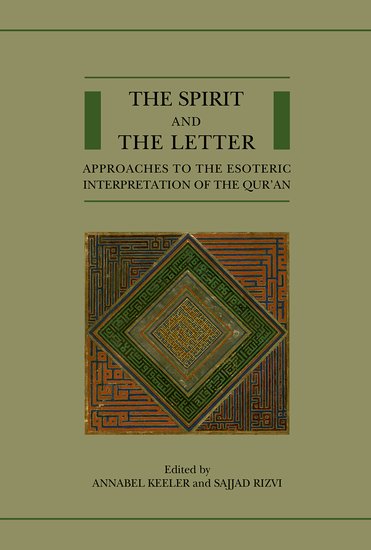 Edited by Annabel Keeler and Sajjad H. Rizvi, this volume is the first to focus specifically on esoteric interpretation as a phenomenon in the field of Qur’anic exegesis and to show the plurality of ways it has been manifested in different Muslim traditions. Concern with the inner, spiritual implications of the Qur’an has usually been associated with mystical and Sufi trends in Islam. However, there have also been exegetes among the Shi’a, as well as among philosophers, who sought to supplement their understanding of the Qur’an’s apparent meaning by eliciting deeper significations through contemplation of the verses.
Edited by Annabel Keeler and Sajjad H. Rizvi, this volume is the first to focus specifically on esoteric interpretation as a phenomenon in the field of Qur’anic exegesis and to show the plurality of ways it has been manifested in different Muslim traditions. Concern with the inner, spiritual implications of the Qur’an has usually been associated with mystical and Sufi trends in Islam. However, there have also been exegetes among the Shi’a, as well as among philosophers, who sought to supplement their understanding of the Qur’an’s apparent meaning by eliciting deeper significations through contemplation of the verses.
The Spirit and the Letter examines the multiplicity of these esoteric approaches, covering a period that extends from the third/ninth century to the present. It includes chapters on philosophical and Shi’i exegetes, such as Ibn Sīnā (d. 428/1037) and Mullā Ṣadrā (d. 1045/1635-6), in addition to studies of a range of Sufi perspectives, from al-Sulamī (d. 412/1021) and al-Qushayrī (d. 465/1072) to Rūzbihān Baqlī (d. 606/1209), as well as representatives of the Ibn ‘Arabī and Kubrāwī schools. Considered together, the range of studies in this volume enable us to see what these approaches have in common and how they differ, and how the hermeneutics and content of exegesis are affected by doctrinal and ideological perspectives of various traditions and periods. Furthermore, they deepen our understanding of what actually constitutes esoteric interpretation and the need to look beyond the letter to the spirit of the Qur’anic word.
Table of contents
Notes on Contributors
Introduction Annabel Keeler and Sajjad Rizvi
Part I: Comparative Hermeneutics
1: The Countless Faces of Understanding: On Istinbāṭ, Mystical Listening and Sufi Exegesis, Sara Sviri
2: The Interpretation of the Arabic Letters in Early Sufism: Sulamī’s Sharḥ ma‘ānī al-ḥurūf, Gerhard Böwering
3: Towards a Prophetology of Love: The Figure of Jacob in Sufi Commentaries on Sūrat Yūsuf, Annabel Keeler
4: Making it Plain: Sufi Commentaries in English in the Twentieth Century, Kristin Zahra Sands
Part II: Commentators and Texts in Focus
5: Outlines of Early Ismaili-Fatimid Qur’an Exegesis, Meir M. Bar-Asher
6: Ibn Sīnā’s Qur’anic Hermeneutics, Peter Heath
7: Qushayrī’s Exegetical Encounter with the Mi‘rāj, Martin Nguyen
8: Shahrastānī’s Mafātīḥ al-Asrār: A Medieval Ismaili System of Hermeneutics?, Toby Mayer
9: Qūnawī’s Scriptural Hermeneutics, Richard Todd
10: Eschatology and Hermeneutics in Kāshānī’s Ta’wīlāt al-Qur’ān, Pierre Lory
11: Simnānī and Hermeneutics, Paul Ballanfat
12: Speech, Book, and Healing Knowledge: The Qur’anic Hermeneutics of Mullā Ṣadrā, Janis Esots
13: Aspects of Mystical Hermeneutics and the Theory of the Oneness of Being (waḥdat al-wujūd) in the work of ‘Abd al-Ghanī al-Nābulusī (d. 1143/1731), Bakri Aladdin
14: The Sufi Hermeneutics of Ibn ‘Ajība (d. 1224/1809): A Study of Some Eschatological Verses of the Qur’an, Mahmut Ay
15: Beyond the Letter: Explanation (tafsīr) versus Adaptation (taṭbīq) in Ṭabāṭabā’ī s al-Mīzān, Amin Ehteshami and Sajjad Rizvi
